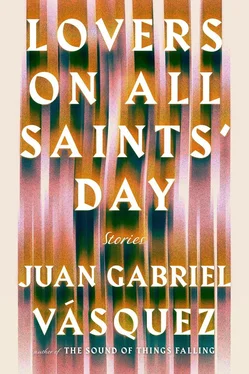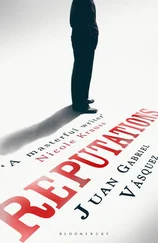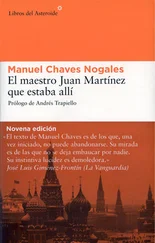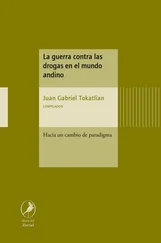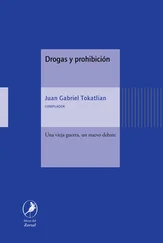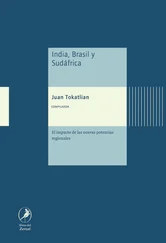She let the needle down onto the vinyl. The music sounded distant, as if coming from the other side of a curtain. Charlotte sat on the other side of the fireplace and switched on the radiator. Seeing her so distracted, in that effort to maintain her serenity, in that dispute with her own affections and with twenty-year-old ghosts, made Georges feel strange, almost superfluous in his own house.
“Do you know why he did it?” he said.
“As if you care,” answered Charlotte.
Georges stood up and offered her a cigarette. Charlotte was not surprised that he’d guessed her wish. The lighter’s flame whispered as it burned the paper around the tobacco.
“He was my friend, too, you know,” said Georges. “Or rather, he was my friend most of all .”
“That address book was going to be a gift for me,” said Charlotte. “Or rather, he did give it to me.”
Georges had imagined. He chose not to say so.
“But you didn’t accept it.”
“I couldn’t. But it’s so pretty.”
“That was after you’d decided to end it.”
Georges’s phrases walked a fine line between statement and query. As he spoke, he looked at the bellows and old newspapers; he stared at the wood in the fireplace although it wasn’t lit. He knew he was irritated with Charlotte, and the effect seemed obscurely agreeable or necessary.
“A long time later. Like four years. We’d drifted apart, there wasn’t any risk. Nothing would have happened if I accepted. But I didn’t accept it.”
Georges made no comment. He listened to her describe the paper Xavier had used to wrap the gift, a page from the newspaper. But not just any page, it was the front page of Le Wallon from March 11, 1963, the date of the last time they’d made love. It was here, said Charlotte, it was in our guest room, Xavier was my guest for a couple of hours and then he left, before you got back from Liège, because he knew he wouldn’t be able to look you in the eye that afternoon. Charlotte had torn the paper angrily and thrown the notebook, with all her might, and it had ended up in the hydrangeas and they’d had to ask Nadia, the youngest daughter of the gypsies, to climb into the shrub to retrieve it. Xavier behaved very stupidly afterward. He gave Nadia a hundred-franc note and told her not to tell anyone about what had happened, and she, with hydrangea petals in her hair, took it without knowing what it was all about. “Why, dear?” said Charlotte. “Why bribe an eight-year-old who’s done nothing but look for a book in the flowers? You’ll scoff, but at that moment Xavier struck me as a faint-hearted coward.” Georges did not scoff. He just listened.
“But it was a lovely little address book,” said Charlotte.
“Useless, though,” said Georges. “Maps of places that don’t exist.”
She pretended not to have heard.
“Later, I asked him if I could borrow it to photocopy one of the maps. Xavier had already given it to Catherine, but he took it for an hour and photocopied all the maps at the paper shop in Aywaille, the one beside Riga. I saved one of those photocopies, just one, the one I liked best. I still have it, dear. If you want I’ll show it to you.”
—
THE ENGINE GAVE three false starts before finally firing up properly. As far back as he could remember, driving a tractor relaxed him, but this was the first time he’d done it at night. Luckily there was no wind, because the cold would have been unbearable; the night was dark, the clouds invisible, the threat of rain persistent. The field where the neighbors’ cows occasionally grazed was less than one hectare; the grass grew during the spring and part of the summer, and Georges waited anxiously for the moment he could climb on his tractor to mow it. It was an old machine, a Ford 5000, but it still worked well; the Gallignani baler it towed collected the hay with its forks and bundled it into cubic-meter bales, which it tied up with a rough cord, so later the youngsters, Jean and his friends and sometimes Catherine, could go around the field picking them up with a pitchfork and taking them to the barn to store until they were sold. This year, the summer was long; at the end of September there was still hay to cut, and tonight, the last Sunday Georges had climbed on his tractor to cut and bale hay seemed recent to him. The land was covered in dry yellow stubble, and had taken on that look of an old dog who’s lost too much fur. Georges flipped a switch; above his head, three white lights came on, the yellow of the loose hay brightened, and shadows appeared behind the wooden posts. It was as if Georges was wearing a gigantic miner’s helmet. The serenity of the night — the crickets rubbing their legs, the short howling of wind in the trees — was soon drowned out by the private racket of the engine. Under the dome of the night sky, in that clearing of light that seemed to come from a reflector hanging from the heavens, Georges felt vulnerable.
What he’d seen in Charlotte’s eyes was not nostalgia: it was nothing immediate, nothing present; it was barely a memory of an infatuation. But it bothered him, perhaps because of what that memory might illuminate. In the pocket of his shirt, folded in four, was the map of the Islands of Pleasure. Charlotte had handed him the page, saying:
“The original is from an eighteenth-century watercolor. It’s from Rajasthan.”
And she’d quickly added:
“That’s in India.”
Georges was shocked by so much precision. The conferring of a date and a geographical location didn’t prove anything, didn’t make the map more credible; pretending to give reasons for which those islands might have been able to exist although in reality they didn’t exist, the date and place achieved, for Georges, the opposite effect. But it would be different, of course, if another person were the origin of that page. Twenty years earlier, it was his wife’s lover who’d handed her what she’d just handed to him. Against his chest, against his left nipple, the page burned; on his tongue, the word Pleasure had a bitter taste, like an unripe blackberry. That was probably not the only thing his wife had sought from Xavier, but he felt that resolving this doubt would console him.
The night smelled of dry grass despite the imminence of winter, which kills fragrance. Georges looked in the direction of the house. An eye of yellow light floated in the air, the tiny bathroom window. He knew what that meant: the door between the bedroom and bathroom was open. Charlotte was reading, or pretending to read, in bed and getting ready to sleep. But she wouldn’t sleep tonight. At that moment, the tractor turned the corner of the pasture and Georges had his back to the light. The noise of the engine and the pinion and the roller isolated him, and behind the tractor he was leaving a corridor of a trail. Any hunter, he thought, could track and shoot him. He was lost in these absurd ruminations, thinking of how he could outwit the hunters coming after him, when the tractor turned to face the yellow window again, and in it was a silhouette. Charlotte’s arms moved in the air, as if she were a shipwrecked woman who had glimpsed a rescue ship. Although he could not hear her, although focusing on the expression on her backlit face was impossible, Georges understood there was some news about Xavier. He left the tractor by the wire fence and walked toward the garden. On the sandstone patio, the chairs leaning up against the table suggested a restaurant that had just closed. Only when he was a few meters from the wall did he look up. Charlotte was a bodiless face disfigured by perspective, a statue on a church’s domed ceiling.
“He’s ready,” she said. “We can go to the wake.”
“You want to go?”
“Of course. I don’t know. I hadn’t considered not going. I feel bad, dear.”
Читать дальше
